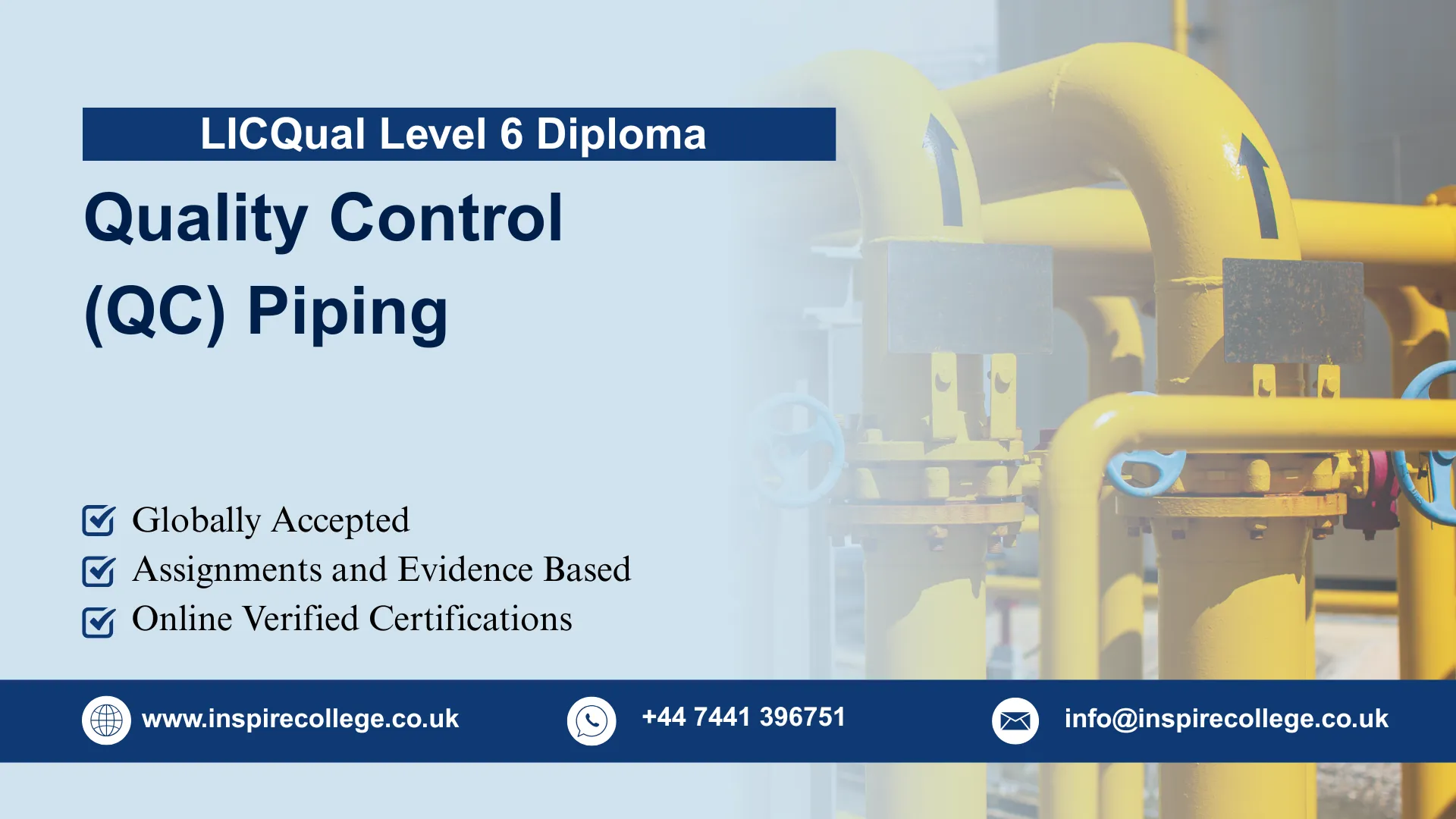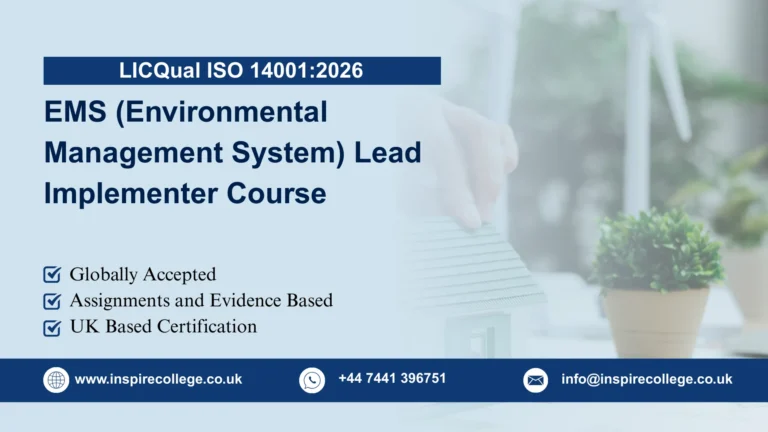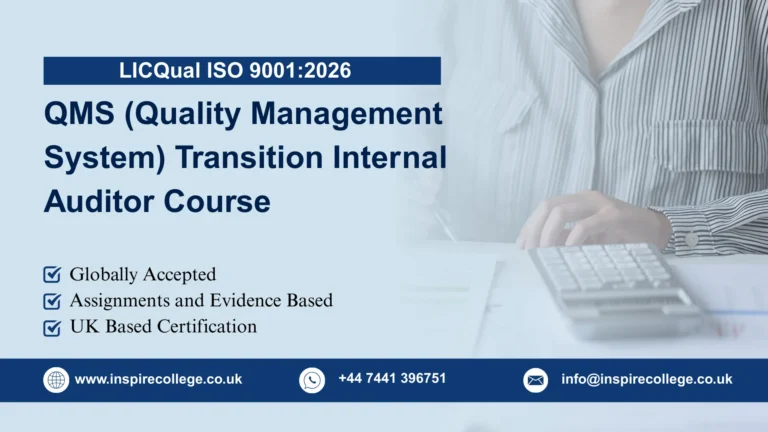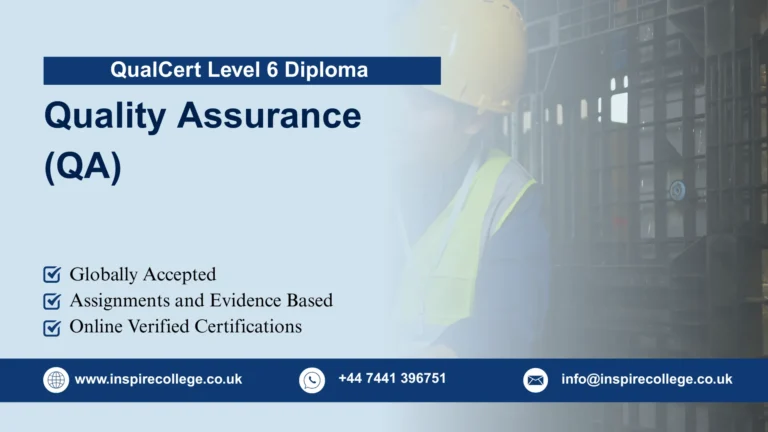
LICQual Level 6 Diploma in Quality Control (QC) Piping
In today’s industrial and engineering sectors, ensuring the quality, safety, and reliability of piping systems is critical for operational efficiency and regulatory compliance. The LICQual Level 6 Diploma in Quality Control (QC) Piping is a comprehensive, advanced-level qualification designed for professionals who aim to develop expert-level skills in piping inspection, quality assurance, and industrial compliance. LICQual Level 6 Diploma in Quality Control (QC) Piping equips learners with the knowledge and practical expertise required to excel in senior QC roles within mechanical, construction, oil & gas, and manufacturing industries.
LICQual Level 6 Diploma in Quality Control (QC) Piping provides an in-depth exploration of piping systems, advanced quality control procedures, non-destructive examination (NDE) techniques, welding and fabrication inspection, and international codes and standards such as ASME, API, and ISO. Learners will gain hands-on experience in interpreting complex piping drawings, conducting inspections, performing tests, and implementing quality assurance strategies that ensure the structural integrity and long-term performance of piping systems.
By completing this Level 6 diploma, participants will acquire the ability to design, manage, and optimize QC procedures for large-scale piping projects. They will also learn to analyze project outcomes, implement corrective and preventive actions, maintain traceable quality documentation, and ensure compliance with global industrial standards. This advanced knowledge prepares learners for leadership roles in piping quality control, enabling them to oversee projects, mentor junior staff, and contribute strategically to operational excellence.
The LICQual Level 6 Diploma in Quality Control (QC) Piping is ideal for senior engineers, quality managers, supervisors, and professionals seeking international recognition and career advancement in piping inspection, mechanical quality assurance, and industrial project management.
To ensure learners are fully equipped to benefit from this advanced qualification, applicants must meet specific academic, professional, age, and language criteria. These requirements are designed to ensure participants possess the technical knowledge, practical experience, and professional skills necessary to succeed in both theoretical and practical aspects of the course.
- Age Requirement
- Applicants must be at least 18 years old at the time of enrollment.
- This ensures that learners have the maturity and professional readiness to engage with a Level 6 qualification, which involves complex problem-solving, decision-making, and advanced technical concepts related to piping quality control.
- The age criterion also aligns with industry expectations for individuals pursuing senior-level roles in quality assurance and inspection.
- Educational Qualifications
- Candidates should hold a minimum of a Level 4 or Level 5 qualification in engineering, mechanical systems, quality control, or a related technical field.
- Acceptable qualifications may include diplomas or certifications in mechanical engineering, industrial technology, or manufacturing processes.
- This educational background ensures learners have a strong foundation in engineering principles, materials science, industrial processes, and safety protocols, which are essential for mastering advanced topics such as piping inspection, welding quality assurance, and non-destructive testing (NDT).
- Professional Experience
- Applicants are expected to have a minimum of two years of relevant work experience in piping, inspection, mechanical engineering, or quality management.
- Practical industry experience allows learners to connect theoretical knowledge with real-world applications, understand operational challenges in quality control, and contribute effectively to project-based inspections and assurance initiatives.
- Experience in sectors such as oil & gas, manufacturing, construction, or process engineering is highly advantageous.
- English Language Proficiency
- As the course is delivered entirely in English, applicants must demonstrate strong proficiency in reading, writing, and comprehension.
- This ensures learners can effectively interpret technical documentation, read engineering drawings, participate in discussions, complete assessments, and communicate technical information accurately.
- Evidence of English proficiency can include prior education in English or standardized tests such as IELTS or TOEFL where applicable.
Mandatory Units
The LICQual Level 6 Diploma in Quality Control (QC) Piping, achieve the qualification candidates must achieve all of the mandatory units:
Mandatory Units
Upon successful completion of the LICQual level 6 Diploma in Electrical Quality Control and Quality Assurance QC/QA, participants will be able to:
Unit 1: Advanced Quality Management Systems in Electrical Engineering
- Understand the principles and components of advanced quality management systems (QMS) in electrical engineering.
- Evaluate the role of quality management systems in ensuring compliance with industry standards and regulations.
- Design and implement quality control measures within electrical engineering projects to enhance performance and reliability.
- Assess the effectiveness of various QMS frameworks (e.g., ISO 9001) in the electrical engineering context.
- Apply tools and techniques to monitor and improve quality standards in electrical systems and processes.
Unit 2: International Standards and Regulatory Compliance for Electrical Systems
- Understand the international standards governing electrical systems (e.g., IEC, ISO) and their global implications.
- Analyze the regulatory requirements for electrical systems across different regions and industries.
- Demonstrate knowledge of the compliance process for electrical systems with relevant national and international standards.
- Evaluate the impact of non-compliance on safety, performance, and operational efficiency.
- Apply regulatory guidelines to ensure electrical systems are compliant with safety, environmental, and technical standards.
Unit 3: Electrical Testing, Inspection, and Performance Evaluation
- Understand the key principles of electrical testing and inspection methods for electrical systems and components.
- Apply various testing methods (e.g., functional, performance, and diagnostic testing) to evaluate electrical systems.
- Analyze test results and assess the performance of electrical systems based on international standards.
- Implement appropriate inspection techniques to ensure safety, quality, and reliability in electrical systems.
- Identify performance issues in electrical systems through systematic testing and propose solutions for improvement.
Unit 4: Risk Management and Safety in Electrical Quality Control
- Understand the principles of risk management in electrical systems, including hazard identification and risk assessment.
- Analyze potential safety risks in electrical systems and recommend effective risk mitigation strategies.
- Apply risk management frameworks (e.g., FMEA, Fault Tree Analysis) to evaluate safety and quality in electrical engineering projects.
- Evaluate the effectiveness of safety protocols and standards in managing electrical system risks.
- Implement safety measures to reduce risks and improve safety outcomes in electrical quality control processes.
Unit 5: Root Cause Analysis (RCA) and Corrective Actions in Electrical Systems
- Understand the concept and methodology of Root Cause Analysis (RCA) in electrical systems.
- Apply various RCA techniques (e.g., Fishbone Diagram, 5 Whys) to identify the underlying causes of electrical system failures or inefficiencies.
- Evaluate the impact of identified root causes on system performance and safety.
- Design corrective actions based on RCA findings to address electrical system issues and prevent recurrence.
- Monitor the implementation of corrective actions to ensure continuous improvement in electrical systems.
Unit 6: Performance Monitoring and Continuous Improvement in Electrical Systems
- Understand the principles of performance monitoring and continuous improvement in electrical systems.
- Apply performance metrics and indicators to assess the efficiency and effectiveness of electrical systems.
- Evaluate the use of monitoring tools and techniques (e.g., SCADA, data logging) to track system performance.
- Design strategies for continuous improvement to optimize the performance of electrical systems.
- Assess the impact of continuous improvement initiatives on system reliability, efficiency, and sustainability.
The LICQual Level 6 Diploma in Electrical Quality Control and Quality Assurance (QC/QA) is designed for experienced professionals seeking to advance their careers in the fields of electrical engineering, project quality management, and compliance. This high-level qualification is ideal for individuals who are ready to take on leadership roles and ensure the integrity, safety, and quality of electrical systems in complex projects.
- Electrical Engineers and Technicians looking to transition into quality-focused leadership roles.
- QA/QC Inspectors and Supervisors aiming to deepen their knowledge and gain an internationally recognized qualification.
- Project Managers and Site Engineers responsible for quality assurance in electrical installations and large-scale infrastructure projects.
- Professionals in Oil & Gas, Power Generation, Construction, and Manufacturing who oversee electrical quality standards and compliance.
- ISO and HSE Practitioners seeking specialized training in electrical quality control and assurance practices.
- Technical Consultants and Auditors who want to enhance their credentials and expand their services in QA/QC operations.
Whether you’re managing quality teams or striving for higher-level compliance responsibilities, this diploma equips you with the skills, credibility, and recognition to lead with confidence in any high-risk or high-performance electrical environment.
Register Now
FAQs for LICQual Level 6 Diploma in Quality Control (QC) Piping






